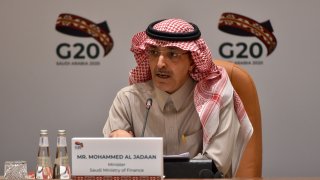
- Saudi Arabia's finance minister has told CNBC that an "even worse" energy crisis could be triggered if the world is not careful with its climate policies.
- "If we are not careful about what we are doing to achieve our targets, we may end up having [a] very serious energy crisis like what we are seeing now, and it could be even worse in the future," said Mohammed al-Jadaan.
- Gas prices across Europe and elsewhere have surged because of a number of factors including increased demand, low inventories and a lack of wind power generation.
Saudi Arabia's finance minister has told CNBC that an "even worse" energy crisis could be triggered if the world is not careful with its climate policies.
"If we are not careful about what we are doing to achieve our targets, we may end up having [a] very serious energy crisis like what we are seeing now, and it could be even worse in the future," said Mohammed al-Jadaan, though he noted that climate policies are "very important."
Get Philly local news, weather forecasts, sports and entertainment stories to your inbox. Sign up for NBC Philadelphia newsletters.
Gas prices across Europe and elsewhere have surged because of a number of factors including increased demand, low supply and insufficient wind power.
Speaking to CNBC's Hadley Gamble Wednesday in an exclusive interview, Finance Minister al-Jadaan called for balance, saying he would like to see developments in new technologies for capturing, reusing and recycling carbon alongside investment in renewable energy sources.
Carbon capture refers to technology that captures carbon dioxide either from the atmosphere or as it is emitted, such as when fossil fuels are burned for energy. Some see it as a promising way to reduce greenhouse gas emissions, though not everyone agrees.
Money Report
"I think we will be a lot safer in both climate change and energy security" if the right balance is struck, said al-Jadaan.
Saudi Arabia is the world's second largest producer of oil, according to the U.S. Energy Information Administration. State oil giant Aramco reported a net income of $25.5 billion for the second quarter of 2021 as oil demand rebounded. In 2020, 62% Saudi Arabia's public revenue was expected to come from oil.
Oil price concerns
Brent and U.S. crude benchmarks have both risen more than 65% this year, and are hovering around multi-year highs.
Al-Jadaan said the kingdom doesn't want oil prices too high or low.
"I don't want a price that is too low, which then will cripple investments and cause a serious energy crisis," he said. He added that "unintended consequences" of policies focusing on renewables in places like Europe had helped cause gas prices to soar.
A "balanced" oil price is one that is good for producers and allows them to continue investing in supply, but does not derail the world's recovery from a "very devastating Covid-19 crisis," he said.
Separately, al-Jadaan also said he is concerned about inflation, but not stagflation.
Economist Stephen Roach has warned that energy price spikes could affect China's supply chain and lead to stagflation — where prices are rising, but economic growth is slowing — in the U.S. and beyond.
"I'm worried a little bit about inflation, and particularly in areas where it relates to energy," al-Jadaan said.
He said energy price rises should be watched carefully, and "people would need to rethink what have we done to cause this shortage … of supply, and try to correct it."
However, he added that the problems are unlikely to be long term ones, and could be resolved in one to two years.
— CNBC's Chloe Taylor, Sam Meredith and Stephanie Landsman contributed to this report.






